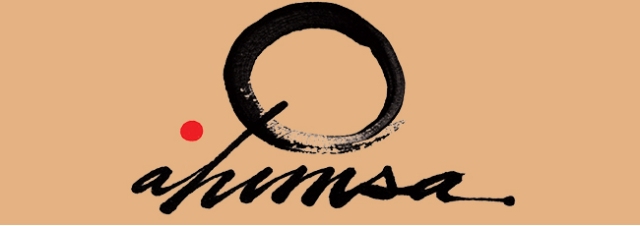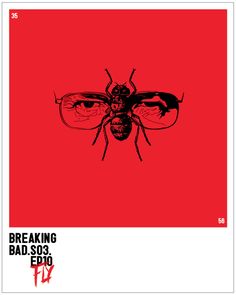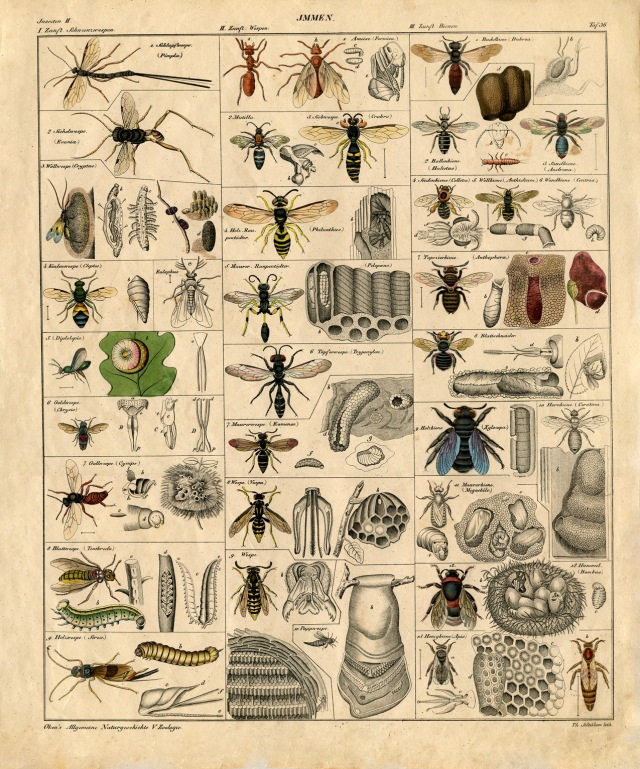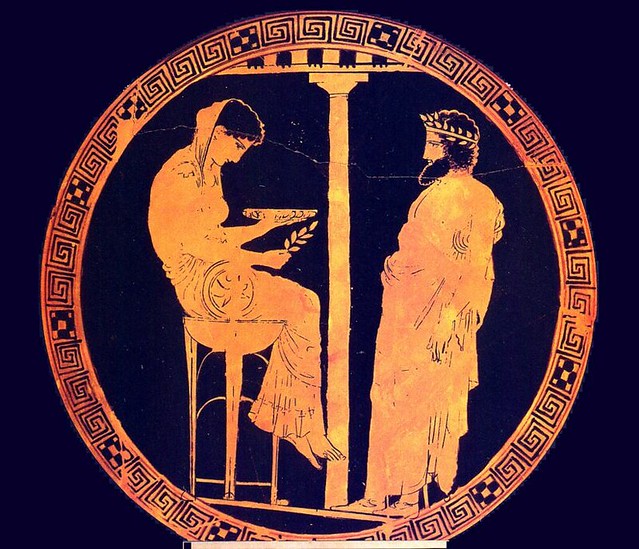Jainism, an Indian religion prescribing a path of nonviolence towards all living beings, professes a doctrine of Ahimsa (non-injury, absence of desire to harm), one expression of which is sweeping the ground with very small brushes before stepping on it so that no life forms get trodden on. In the West, our approach to insects is quite the opposite: we despise them, associate with dirt and diseases, we are repulsed by them. In that, we are very far in our approach from ancient Egyptians, who revered the humble dung beetle as the symbol of the rising sun, renewal, transformation and resurrection.
In Kafka’s Metamorphosis, the monstrous vermin the main character transforms into is the ultimate symbol of utter repulsion and rejection. But there is a deeper meaning to Kafka’s story. Gregor Samsa’s metamorphosis into an insect is his psyche’s reaction against sadistic one-sidedness of patriarchy. Because our dominant Western religion has been removed from the earth and has lost connection to its chthonic roots, we can see nothing sacred in the humble insect. In the original German of Metamorphosis the insect is called “ungeheures Ungeziefer,” which means “an animal unfit to sacrifice,” dirty, unholy.
Drawing from popular culture, a psychological affinity between human and insect is quite significant in the symbolism of a TV series “Breaking Bad.” Hank Schrader, a macho DEA agent relentless in combating drug crime, compares the offenders he tracks to cockroaches who crawl from under the fridge and need to be stepped on and squashed out. In a related scene, Jesse Pinkman, a meth manufacturer with a heart of gold, spots a black beetle on the ground. He crouches to take a closer look at the little creature, cradling it tenderly on his finger, then releasing it gently. In another scene, a young boy catches a tarantula into a jar while biking through a desert. A few hours later he becomes and unwitting witness to a crime and gets shot in cold blood – squished like an insect. As time goes by and the main protagonist’s (Walter white, chemistry teacher turning into a drug lord) soul gets more and more calloused, he begins to view murder as a mere act of swatting a fly. In fact, he seems to walk the opposite path than that of Raskolnikov, the protagonist of Crime and Punishment, who murders a greedy pawnbroker for cash to prove to the world and to himself that some people can commit murder for higher purpose (to rid the world of vermin). He says: “I killed a loathsome, harmful louse, a filthy old moneylender woman who brought no good to anyone, to murder whom would pardon forty sins, who sucked the lifeblood of the poor, and you call that a crime?” Dostoevsky’s novel tells the story of Raskolnikov gradually reclaiming his humanity, while Walter White gradually loses it. Simultaneously, the New Mexico desert in all its glory, the sky above it, the whole natural world, life itself, the cosmos, preside over all events, eternally beautiful and constant in their cycles. Insects seem to be visitors from the non-human cosmos, which we, the moderns, have lost touch with.
In his essay “Going Bugs” included in the tome Animal Presences, James Hillman offers a comprehensive look into the significance of insects for our psychology:
“We have yet to understand why the bugs raise such anxiety that eradication becomes the automatic response. This automatic step from fear to eradication leads to a further one into the world – pesticides. … This overkill may have its source in four frightening fantasies attributed to insects as their qualities.”
The qualities he attributes to insects are multiplicity, monstrosity, autonomy and mystery. The sheer number of insects, swarming in our imaginations, poses a threat to our uniqueness and individuality. This point to “fragmentation and the lowering of individualized consciousness to an undifferentiated, merely numerical or statistical level.” Symbolically, it threatens with the loss of centralized ego control. An ant colony, a locust cloud, a swarm of bees also demonstrate “wholeness, not as an abstract ideal but as a busy, buzzing body of life going every which way at once.” Because they are autonomous, impossible to control, we want them to be “crushed, burnt, and poisoned because they do not submit.” “The pesticidal ego” is terrified that it will be stripped of power and control, as it knows it is surrounded by flesh eating, relentless forces of nature. Bugs thrive on our “vegetative roots” – we are sharing our bodies, our food and our property with them.
In depth psychology terms, insects demonstrate a terrifying vision of “being eaten up by one’s complexes.” We fear “disintegration into myriad parts, infestation with discarded filth (the return of the repressed), affected by monstrosities.” In science fiction movies, insects are responsible for alteration of personality – the ego’s ultimate threat. The ego’s view of the personality is narrow and limiting while insects symbolize “the hungry unlived life that also needs food at your table.” Further, insects show us that in fact we humans are parasitic as well:
“If, as Jung said, the unconscious turns the face to you that you turn to it, then a parasitical invasion brings home to the host specifically how it depends in tiny hidden ways upon other psychic organisms, how it is influenced by complexes, how we use their blood to sustain our ambitions. The complexes, upon which we depend for our daily personality and from which we draw our energetic compulsion, show up in the dream as parasites, showing us up to be one among them, feeding off life’s banquet by taking care of number one, whether in workplace, family, friendship – or feeding off the dreams themselves, interpretation as a parasitical blood-sucking act, taking all, giving nothing back.”
Most naturally, insects feed our fear of death. They appear to come out from beyond, from the soil, from the underground, from hidden corners of “day-world structures.” They startke, appearing seemingly out of nowhere and suddenly, frequently announcing their arrival with otherworldly buzzing and ominous sounds. As Hillman says: “We re-enact the conquest of Christ over Pluto with our aerosol can of bug spray, swinging that censer in secular ritual, ridding each our own Garden of underworld demons.” No matter how many of them we exterminate, often harming ourselves with pesticides in the process, insects will remain primordial messengers of the unconscious life of the psyche and a symbol of all that we reject and are repulsed by in ourselves.
Source of quotes:
James Hillman, Animal Presences, “Going Bugs” (Kindle edition)


















Reblogged this on lampmagician and commented:
“If, as Jung said, the unconscious turns the face to you that you turn to it, then a parasitical invasion brings home to the host specifically how it depends in tiny hidden ways upon other psychic organisms, how it is influenced by complexes, how we use their blood to sustain our ambitions. The complexes, upon which we depend for our daily personality and from which we draw our energetic compulsion, show up in the dream as parasites, showing us up to be one among them, feeding off life’s banquet by taking care of number one, whether in workplace, family, friendship – or feeding off the dreams themselves, interpretation as a parasitical blood-sucking act, taking all, giving nothing back.” ❤ ❤
LikeLike
I just re-read “Dream Animals” by Hillman–it was a gift from a internet/mIRC (?) that eventually became a pen pal. I love this article, and will have to check out that book. Someone up at school asked if I was a Jainist after I rescued a bug that had landed on our papers while we were working on a project at the school library. I’m trying to figure out how to rescue the little ant highway I have threading across the bathroom floor, and am avoiding stepping where they are busily at work. Oh, and I just spotted an Eastern Eyed Click Beetle while taking out the trash, although my guidebook said they don’t range into the Southeast. Okay, so yes, I love bugs! This is one of my favourite posts you’ve done! Thanks for putting this together!
LikeLiked by 1 person
Hello @ Chaos Realm! I think it is so understandable that you should love bugs if your adopted name is “Chaos Realm.” Insects are scary to some because they embody chaos, I think. Thank you very much for your kind words and sharing this post.
LikeLike
Reblogged this on The Realm of the Chaos Fairy and commented:
Because I love insects, etc., check out this wonderful post by Symbol Reader!
LikeLike
Wow – the breadth of this is wonderful, the way you weave all these threads of ideas and references together… the Jesse character gave me so much torment as a viewer – his sweetness and so many wrong turns, so many stumbles, agonizing to watch. However I missed that beetle detail – fascinating.
LikeLiked by 1 person
Hi Kat, Jesse is by far my favorite character ever seen on TV. Originally, he was supposed to die in the first series! Anyway, this post was actually a little bit inspired by your last one on forces of nature and the beauty of “weeds.” Thank you.
LikeLiked by 1 person
So cool… the beauty of the internet…. 🙂
LikeLike
I found this essay thought-provoking, because I like bugs. The giant beetles in New Mexico amaze me. I let little wasps walk on me if I’m meditating outdoors, not frightened by those tiny feet on my skin. I enjoy the didgeridoo buzz of their close passage, a reminder to wakefulness and attention. I evict bugs from my home, of course, but they don’t repel me. Thanks for bringing them up.Insects are often beautiful. The yellow legs of a wasp, the shiny black face of a bee, even the pottery-pattern back of the reviled stink-bug. Now I have been publicly crazy–a bug fan!
LikeLiked by 1 person
Thanks for a wonderful and loving homage to bugs. I hope one day I can reach your level. For me, this post was like shadow work because a lot of insects frighten me. Still, I strongly believe we mustn’t harm them.
LikeLike
Fascinating post.. I can relate many people are scared of insects.. I have a daughter in law who loathes anything with creepy crawly legs.. My own fear used to be of spiders, but I overcame that fear.. and insects never did seem to bother me as much as the eight legs.. But now I can easily catch a spider and put it outside..
I wonder if people realise the benefits of the bugs in the world.. All have a job to do.. ( including bugging us 🙂 ) …LOL
Loved reading Monika… it was a really interesting subject and read.. Thank you xxx Sue
LikeLiked by 2 people
Dear Sue, many, many thanks! I think I was conditioned by my mum to be scared of all insects and have been trying very hard in my adult life to overcome my phobia. I know they have a grand rule to play in the Great Design.
In gratitude,
Monika
LikeLiked by 1 person
I try hard to show my granddaughter the bugs and allow the caterpillars and beetles to crawl over me.. She is now very tolerant of them and will even pick up snails to move off plants if they are eating them 🙂 I think alot of our fear is learnt behaviours xxx Enjoy your week.. Hugs Sue
LikeLiked by 1 person
How wonderful.
Best wishes to you, too.
LikeLiked by 1 person
I love this. I was also just thinking the other day of the episode of Breaking Bad where the main plot of the episode is just Walter and Jesse trying to kill a fly that has gotten into their lab, and how the episode seemed to highlight Walter losing it, basically.
And it’s actually one of my biggest pet peeves when people instantly kill an insect as reflex… from a removed stand point, it’s a strange scene to behold.
I’m really into viewing insects as symbolic messengers. They have very different vibrational personalities.. a dragonfly or a praying mantis is going to inspire a different emotion in me than a fly, for example. I keep my insect fascination on the down low a lot of the time because of the discomfort I sense they bring up but every now and then I could probably talk for a few hours about them 🙂
LikeLiked by 1 person
Hello Sabrina, I think that fly episode was sheer genius! And I am totally with you on your pet peeve. I heard about an interview with Obama during which he swatted a fly. I think he got a lot of criticism for this. Good! I did treat insects collectively in my post but I do agree they have very distinct symbolic messages to convey.
Thank you very much for commenting.
Monika
LikeLike
Oh Monika!
You know I love that essay of Hillman’s and his and Margot McLean’s entire book, Dream Animals. Great post here with fine points about the common everyday pathology of western culture.
Maybe it is that bugs, so little, anger us because of a perceived injustice that something so small could get to us?
Hugs,
Deb
LikeLiked by 1 person
Hello Debra,
You have a good radar for all things Hillman!
Thank you very much for visiting. You made me very happy.
Monika
LikeLiked by 1 person
I must confess to murdering cockroaches as I don’t like them in my kitchen. But I won’t use any toxic chemicals and hate unnecessary cruelty to any creatures and I have a good relationship with my night time geckoes which eat them. Around these parts we have to be very mindful of termites which are very prevalent and destructive. I have many big termite mounds which are pretty awesome, as is their healing capacity apparently for skin ulcers etc. I have a huge respect and love of the Natural kingdom and won’t have any domesticated animals as I encourage a wildlife sanctuary here. I feel like it’s just part of the flow and a natural order. I don’t fear organic creatures. I put any small food scraps out in a sunny spot for the ant people I call them, while being fully aware that some other creatures will probably come along and eat them. My termite loving echidna is a delight to come across in the undergrowth. I am accepted by all the creatures here and it’s a very simple, relationship with all.
LikeLiked by 2 people
This sounds like a wonderful symbiosis – so at one with nature. There is also a lot of wildlife where I am – I cannot imagine living far away from nature (Taurus moon). I had to look about the echidna – they are so cute.
Thank you for sharing a slice of your Gaia life.
LikeLike
Monika, this is so important to me. I love the illustrations and the way you have analyzed this subject from every perspective possible. I love how you start the post with the word “Ahimsa (non-injury, absence of desire to harm)”, and the fascinating fact that ancient Egyptians revered the humble dung beetle as the symbol of the rising sun, renewal, transformation and resurrection.
How discerning:
“An ant colony, a locust cloud, a swarm of bees also demonstrate “wholeness, not as an abstract ideal but as a busy, buzzing body of life going every which way at once.” Because they are autonomous, impossible to control, we want them to be “crushed, burnt, and poisoned because they do not submit.” “The pesticidal ego” is terrified that it will be stripped of power and control, as it knows it is surrounded by flesh eating, relentless forces of nature. Bugs thrive on our “vegetative roots” – we are sharing our bodies, our food and our property with them.”
As usual Monika, another post leaving me deep in thought. Thank you!
LikeLike
Dear Maria,
Thank you for a delightful comment and for reading my post so attentively. This really makes me want to apply myself more.
In deep gratitude,
Monika
LikeLiked by 1 person
Reblogged this on Sindy's Saturday Satsang.
LikeLike
Great post. There was another Breaking Bad episode where Walter was obsessed about the fly in the meth lab. He spent almost the entire episode trying to get the one fly, which had the potential to ruin his pristine product.
LikeLiked by 1 person
I loved that episode – such brilliant writing. I see so many people that read my blog also loved that show. At one point I almost wrote a post about it but then I thought I would have to include too many spoilers.
LikeLiked by 1 person
Yeah, I find myself faced with that issue sometimes with books/stories. I do my best to avoid spoilers and instead explore symbolism, metaphors, language, etc. But you probably know this already 😉 But yes, Breaking Bad was excellent. I am looking forward to watching Better Call Saul once that starts streaming.
LikeLike
Afterthought: I know we discussed Star Trek – Next Generation. Have you considered the Borg and their insect-like hive mentality?
LikeLiked by 1 person
Great analogy. Individual consciousness was what spelled the Borg’s doom 8n the end One of my favorite episodes is Conspiracy in which alien parasites take over Starfleet command. http://en.memory-alpha.org/wiki/Conspiracy_(episode)
LikeLiked by 1 person
Your site is awesome. Helps me a lot
LikeLiked by 1 person
Thank you!
LikeLike